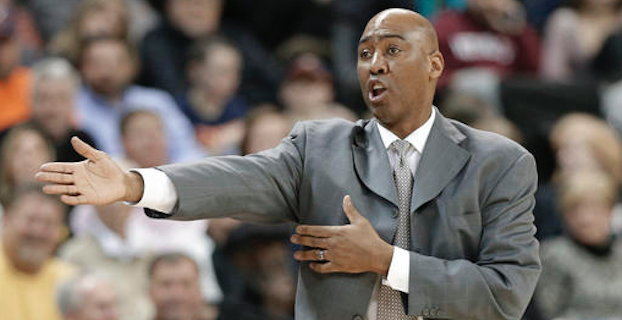The ACC’s Operation Basketball event is a time for optimism. Every coach is undefeated so far this season, and every player has unlimited potential.
That also applies to Wake Forest: New faces will take the court, leading to hope for a return to the winning ways of the past.
But what are legitimate expectations for this team, and how long is Danny Manning going to be allowed to be in a “rebuilding phase” before the heat turns up?
The Deacons are young: Only three players expected to be regular contributors are upperclassmen. They return one double-digit scorer (Bryant Crawford), and they lost two four-year starters in Codi Miller-McIntyre and Devin Thomas. They’ve been one of the ACC’s worst defensive teams for several years.
Manning seems undecided about how optimistic to be. He’s called the team a work in progress, which it is, but also said that they could to do some “really big, really special things this year.”
The Deacons should be a better shooting team. In a time when basketball has turned into a pick-and-pop game, Wake Forest shot 31.6 percent from three-point range last season — worst in the ACC and No. 301 nationally.
Manning addressed that by adding transfer Keyshawn Woods, graduate transfer Austin Arians and recruits Brandon Childress and Rich Washington. Perhaps those better shooters also can help Wake Forest’s free-throw percentage, which was second-to-last in the ACC.
Whether the Deacons can improve in their other trouble areas is yet to be seen; they finished last in the league in scoring defense, defensive rebounding and turnover margin last season.
What the Deacons don’t have is star power. Although Crawford made the All-ACC Freshman Team last year, not one Deacon received a preseason vote from the media for All-ACC first or second team, player of the year or rookie of the year.
That means someone — or several players — will have to make an unexpected jump forward to help Crawford. Maybe it’s Woods or Arians or Crawford’s classmate John Collins, but the biggest help would be if big men Dinos Mitoglou or Doral Moore emerged to play a big role.
If they don’t, how long will Manning’s honeymoon last? He’s provided a new optimism around the program, been in the hunt for more talented recruits and carries a great basketball reputation.
But because Manning has improved the optics of the program, it’s easy to forget that his on-court record has actually been worse than Bzdelik’s final two seasons. Bzdelik won 30 games in those two years as he was headed for the door, and Manning has won 24 in his first two.
While Manning’s biggest challenge is to change the talent level of the program, he also has the disadvantage of being in a league that might be as difficult as it has ever been. When he looks up, there aren’t many programs that will be easy to jump over. Five ACC teams made the Top 25 in the preseason coaches poll, and six more received votes.
Even an improved Deacon team might have trouble sniffing .500 in the league, and the nonconference schedule is no slouch. Manning’s saving grace right now is that he landed Chaundee Brown, a top-35 shooting guard in the 2017 class. That buys him some time from fans, but a third straight losing season may turn up the heat, making 2017-18 a win-or-else season.
Looking at the projected 2017-18 roster, with Brown replacing Arians, Manning still might be short at least one key piece. Perhaps experience and improvement from current players will close that gap (especially if it’s Moore). Perhaps another graduate transfer can do that job.
If not, athletic director Ron Wellman will be staring at eight straight years of losing records in conference play. This in a program that only had one losing season (15-16 under Skip Prosser in 2006-07) from 1991-2010.
At that point, the only thing Manning could stand on would be if he landed more top recruits. Bzdelik didn’t have that, and he was fired. Manning appears to have a better chance, but he’ll have to get it done quickly, both on the court and off.

















